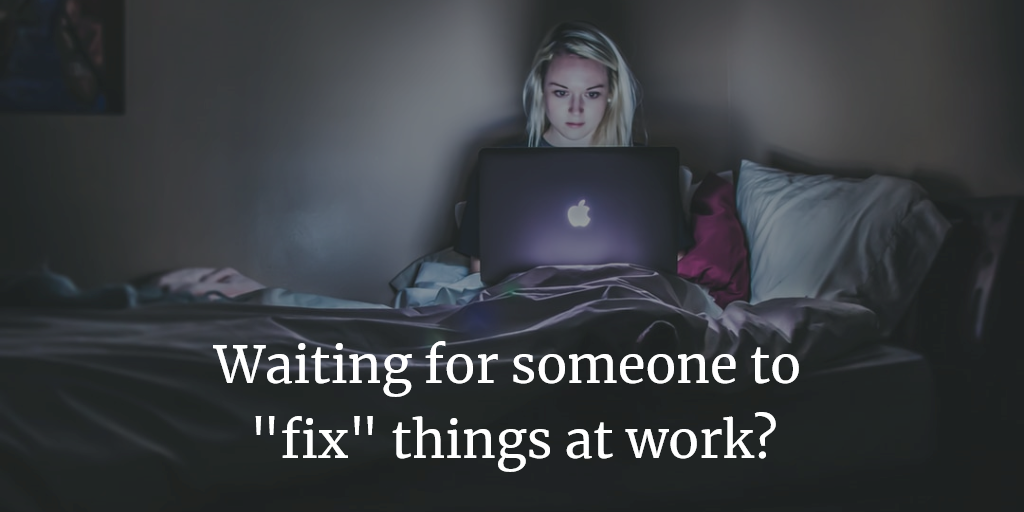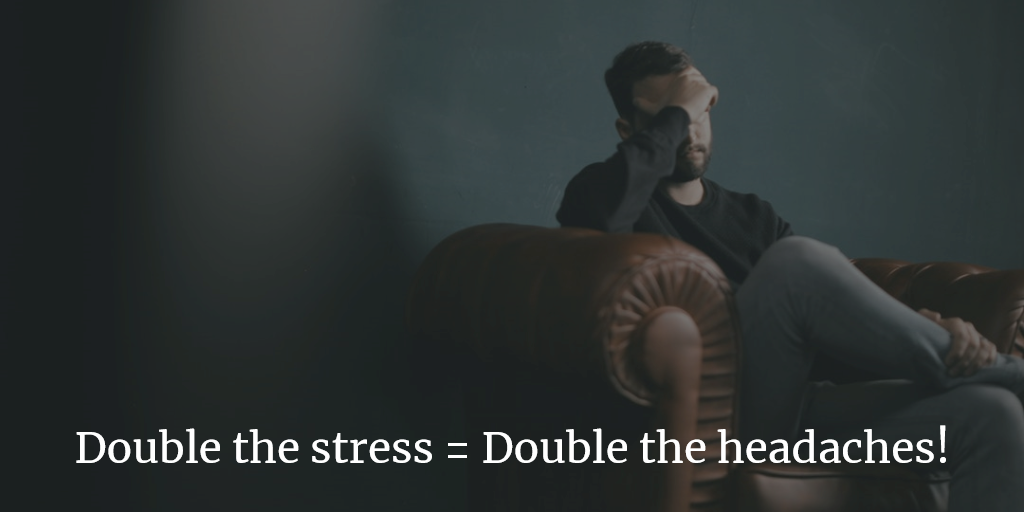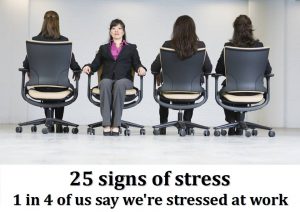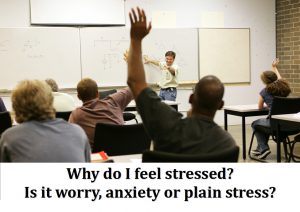
Stress has doubled in Irish workplaces – it’s not just a headline 
People bickering; blame games; angry outbursts; missed deadlines; people hating going in to work, and finding they’re taking the bad feeling home, are all too common aspects of work stress. And apparently, we are seeing twice as much of that as a few years ago according to the European Working Conditions Survey.
It’s damaging to people’s health and it’s costing businesses a fortune. When stress doubles, it means more people suffer and more businesses sustain losses from it.
Yet, most businesses have simply seen the headline and are ignoring the reality.
Let’s put this in context: Twice the stress is twice the sleepless nights, lying awake, mind racing, worrying about what happened and what will happen.
It’s twice the conflict, twice the aggression, twice the blow ups that then fester into damaged working relationships and people trying to work around the colleagues who should all be part of a smoothly flowing system.
It’s twice the amount of people going home from work stressed, being grumpy or snappy with their families.
Twice the number of people lacking the energy to play with their kids or take part in the usual social activities after work.
It’s twice the people thinking ‘I hate my job’. ‘It used to be fine but now I can’t even think about it’. ‘I need to move jobs!’
Sadly, unlike when a computer breaks, or something gets lost, it’s not as obvious as to the cost. Yet it is real and easy enough to calculate.
Most people don’t realise that it’s not just time off sick or with stress that is the big expense – it’s the cost of people being present and working below par. This ‘Presenteeism’ costs twice as much as Absenteeism. On top of that is the cost of turnover of staff – replacing someone is expensive. Training them is expensive. The lost productivity until they are up to speed, is expensive.
Why am I mentioning this? Because what is an obvious and common-sense thing – that stress should be reduced, needs a financial incentive to make it happen.
Businesses run on money. The pain, unhappiness and anger of staff is easier to address when we see just how much it’s also costing the business.
A 2010 study showed savings of over 3 to 1 in response to Workplace Wellness Programs (Baicker et al, 2010). That means for the businesses investing in those, they saw a reduction in costs of over €3 for every €1 spent.
It makes it a lot easier to start thinking of doing something about stress when viewed in that light.
My advice is to make a brief list of ‘flashpoint’ stress indicators and see if the workplace is moving in the right or wrong direction. This will let you know where things can improve and generate awareness of what to start with.
Think about whether each issue is increased this year, reduced this year, or the same as previously.
Arguments
Sick Leave
People seeming down at work
Missed deadlines
Managers spending more time managing disagreements
Miscommunications (“But you said to do it this way…” etc.)
Increase in bullying or accusations of bullying / unfairness
Increased overtime to catch up on targets
People seeing only problems – creativity and solution-finding is down
Complaints of headaches and muscle pain
People showing up late for work
These are some of the more obvious external signs of stress in a workplace. Obviously, they all impact on success and achievement.
Taking action early is best. Taking action now is the next best option.
Stress has doubled in Irish workplaces. Can yours be the opposite?
Wishing you a calm and productive working day,
John
www.AchievementFulfilment.com
John Prendergast is an internationally recognised award-winning Therapist and Coach who lived decades with severe anxiety and depression before he found the help he needed to overcome those challenges and to build a happier and more successful life.
Now followed in over 100 countries and speaking internationally, John helps people from all walks of life from Army Officers, Business People, and Elite Sports People to Homemakers, Entrepreneurs, and Students.
His specialist areas include: Communications, Stress and fear systems of the mind, and how these systems generate the experiences we think of as stress, overwhelm, and anxiety. He also has training in Strategic Negotiation, Public Relations, Marketing Psychology, and Systems Development.

I’m surprised it counts as news that ‘Irish workers are sleep deprived, stressed and not giving 100%’
What I don’t like is the implication there that it’s their fault. Not giving 100% should have read ‘not able to give 100% because they are sleep deprived and stressed’, in my opinion.
Sleep Neuroscientist Prof Jim Horne’s study was reported on in the Irish Times this week and there’s a lot we would expect and which we usually ignore:
80% of us admit when we get a poor night’s sleep we deliver a poor day’s work.
More than 1 in 3 of us are exhausted every day.
82.5 per cent of the Irish workforce cited workplace stress as a key cause of their disrupted sleep.
Professor Horne’s punchline is:
“Most work situations require individuals to make critical decisions, remain focussed and complete tasks within a timely and efficient manner. However, it’s clear from these findings that sleep loss can impair attention to detail amongst workers,”
The article goes on to say “Last month, sleep expert Els van der Helm – who spoke at the Great Place to Work annual conference in Dublin’s Mansion House – said “sleep deprivation is a global epidemic that’s hurting us on multiple levels”.
Prof van der Helm said that while companies have cottoned on to the advantages of having well-rested employees, the emphasis was on how having a healthy lifestyle could support strong work performance.
“People were eating well, taking exercise and doing things like yoga and training in stress and time management, but were ignorant of the fact that sleep is the foundation for good health and therefore for good performance.”
So what can we do if work is a source of elevated stress?
Typically we’re all aware that there are ways we can feel better, but that’s a long way from businesses committing to do something about it.
While management wants to help employees they are caught between shareholders and those under pressure. The bottom line is it has to make more money to deal with the problem than to ignore it.
That’s an easier case than most realise.
The UK’s NHS estimates 45% of all sick days are due to stress and this is supported by the UK 2016 Labour Force Survey (LFS).
People being present at work but working below par is estimated to be over twice the cost of absenteeism. (Evidence shows a ratio of 1:2.5 for the cost of absenteeism to presenteeism – British Heart Foundation).
The cost of staff turnover, or ‘churn’ if bad, is huge. It takes time to replace and train up skilled people who are used to the companies way of doing things and ‘about a fifth of staff turnover can be related to stress at work’. (CIPD, 2008a)
It’s also relevant to safety at work – “among employees who state that they ‘always work under pressure’, the accident rate is about five times higher than that of employees who are ‘never’ subject to pressurised work (Eurofound, 2007).”
A calm workplace is a safer workplace, one where people stay, and one which makes more money. It can be a win for all from the newest employee to the oldest shareholder to reduce stress.
We’ve put together a cost calculator based on the NHS figures which you can use for free here:
http://achievementfulfilment.com/stress-cost-calculator/
You can also find the British Hearth Foundation Absenteeism Cost Calculator here:
https://www.bhf.org.uk/health-at-work/get-started/cost-savings-calculator
Whether you’re the employee or the owner stress stays until someone makes the case for change.
That’s much easier to point to the value of it when you look at the solid evidence of how it will make health better, the working day easier, and the profits higher all at one.
The NHS also estimates that even simple steps and training can cut the financial cost of stress by at least 30%. This is supported by the findings of the Health at Work Economic Evidence Report 2016.
For more information on how we can make dealing with stress into something that saves money, improves health, and gives a happier workplace call or email us.
Have a great week,
John
John Prendergast (Hy.Psych)
Co-Founder Achievement Fulfilment.
John@AchievementFulfilment.com
085 13 13 700
Once we understand something we are more in control of it.
This is very true about stress and negative emotion whether it’s at work, home, or elsewhere the mind is using systems to try and help – but left run riot it can feel very bad and hold us back.
Here’s an explanation of the model at work in the brain and some advice to start retaking control.
Hope it helps.
Have a great week,
John
John Prendergast
Award winning Therapist & Mind Coach.
www.AchievementFulfilment.com

There are a lot of ways stress can effect us. We’re all different, but here are the common ones that many people might feel:
1. Feeling overwhelmed – Often like there’s no point to trying because there’s too much to do.
2. Feeling frustrated & Irritable. Snapping at colleagues or family, exploding into anger.
3. Tension or pain in head, back and shoulders. Sometimes dizzy spells, sharp pain, or constant tension.
4. Difficulty concentrating. Easily distracted, flipping between things, hard to stay on task.
5. Less confidence. Feeling unsure of self, particularly in situations involving people.
6. Irritable Bowel Syndrome. Pain, frequent bathroom visits, constipation, churning, or bloating.
7. Second guessing self. Decisions becomes harder, take longer to make, & poor follow through.
8. Over-analysing things. We go back over things a lot, re-examining them, and get slowed down.
9. Heartburn. Getting more acid reflux is quite common.
10. Lower Immune System. We catch more colds & infections and take longer to get over them.
11. Palpatations, rapid pulse, chest pain. Can also make catching our breath harder.
12. Diminished Libido. Sexual interest can drop, creating relationship problems.
13. Change in appetite. Can lose interest in food or fall into comfort eating when not hungry.
14. Feelings of Panic. Perhaps even ‘heart attack’ like panic attacks and overwhelming dread.
15. Poor sleep. Taking a long time to fall asleep, early waking, or interrupted sleep can occur.
16. Sweating or blushing. When under pressure we are more likely to react physically.
17. Mouth going dry, difficulty speaking. Feeling ‘on the spot’ can bring these on more easily.
18. More worry and anxiety. Feeling nervious, being twitchy, tapping feet etc. to relieve tension.
19. Poor concentration. Difficulty learning new things, staying focussed in a meeting, confusion, etc.
20. Depression. Feeling down, feeling worthless, feeling undervalued, & low self esteem can occur.
21. Defensive and suspicious feelings making the workplace harder. More conflict & arguments.
22. Isolation. Avoiding people and social events, feeling unable to face colleagues.
23. Constant tiredness. Low energy, fatigue, exhaustion, dragging self through the day.
24. Far less productivity. A decline in getting things done/finished often accompanies stress.
25. Dreading work. Spend Sunday nights being a ball of worry about Monday morning and so on.
All of these can be signs of a build up of stress. It can destroy lives, cut business productivity, and see great people leave the workplace to avoid it. The cost is enormous in money terms too.
Stress reduction can come in many forms, but the key is realising that all of these symptoms occuring in the human body, are all triggered by the mind. Because of this implementing new structures or procedures aimed at reducing stress is a lot harder when we are already stressed.
A complete approach can be far more effective in both costs and levels of success. It is more beneficial if existing stress is reduced before the extra work of new changes is implemented. Then it becomes easier to keep stress down long-term.
If stress is present in your workplace, look at reducing it individually as you go. A stressed manager will inadvertantly create extra stress down the line. Getting that person’s stress down means they can achieve more in making the workplace less difficult and more productive for everyone.
Here’s a simple step-by-step explanation of one method to create a more productive and less stressful enviroment when stress has already been identified as a problem:
1. Recognise that our perceptions, reactions, and judgement are influenced by the stress. Our efforts to restructure/reprocess the enviroment are influenced by this.
2. Maximise ability and achievement in any new system. A reduction in the stress levels of those implementing the new systems, will yield a better result.
3. Use fast and effective personal stress reduction techniques with those implementers. The project will get the right start and will be continued well.
4. As you progress make personal stress reduction techniques available to all the effected staff This is so that the new procedures are not conflilcting with the stress that is present, but are easier to achieve as individual stress is reduced. This will allow people to adapt and improve more quickly and with less strife.
5. Recognise stress for what it is: A series of biochemical and physical reactions. Tackling it on those levels is the most successful way.
6. Any plan needs to include a fail-safe system of recognition of a reocurrence of stress. Simple tracking of productivity, absenteeism, and conflicts can be used as an early warning system to ensure stress levels don’t rise again without intervention.
Stress can be disastrous and is often left to run too long before it is dealt with, in businesses and organisations. The ‘anything for a quiet life’ approach of ignoring the issues usually costs a lot more down the line and creates a bigger problem. Notice if stress is present; notice how it impacts your group; dial down stress levels; put in place structures to keep it down, then keep an eye open for any signs of it growing again, to be sure you’re on top of it and generating a more productive, successful, and happier environment.
It’s in our hands. Take control of it. Inaction is disaster.
Wishing you a stress-free week.
John

Many things can feel like similar things so how would someone know if they might be suffering stress?
Here’s 6 common ways it shows itself:
1. Stress comes about when more pressure and bad feeling is taken on-board than we can deal with. It grows slowly in many cases so it can be hard to notice, but there are several sure signs not to ignore. The most common one is becoming irritable, short with people, and a feeling of frustration or anger.
2. Low energy, lack of motivation, and disinterest in things where previously we felt more motivated is a very common sign of stress.
3. Constantly being on alert, noticing small detail, worrying about little things and finding that the mind is always busy are also things that can help us spot it.
4. A big, and often damaging feeling is one of not being as confident, having lower self esteem or valuing ourselves less. Negative beliefs like ‘I’m bad at this’, ‘no one can be trusted’, ‘the office is always bad’ and so on can occur.
5. Anticipating bad feeling and creating more in advance is where many people notice it. Sunday night becoming a time of worry so its as bad or worse than Monday morning, or having a knot in the stomach for days before a meeting are the kind of thing this creates in life.
6. A feeling of ‘what’s the point’ and not wanting to help ourselves sometimes comes with stress, but stress is controllable and can easily be reduced when we decide it’s important enough for us to make change a priority.
The big question, in my opinion, isn’t what label we put on it, but simple seeing clearly where is the opportunity to improve things.
Whatever is present, is it something worth working towards changing? Defining the issue in a more objective way allows us to tackle it and to plan ways to make progress, rather than just react to any bad feeling.
Have a look at how things can get better, then make a plan to act.
Every best wish for success.
As always feel free to get in touch if you have any questions or if you’d like to chat about how life can improve. Tel: 085 1313700www.JohnPrendergastCoachin
Have a great day.
John

I recently wrote a piece on stress identifying 25 symptoms. They are all also symptoms of anxiety! So, what’s the difference?
Whether we feel overwhelmed, take things personally, beat ourselves up when something goes wrong, or worry and fret, it’s all the one system that creates these symptoms. Why we create them is where the difference lies.
Anxiety is that function in the brain that looks for something to worry about and makes a bigger feeling out of it than needed. It activates the mind/body stress systems as the way to create attention and push behaviour. Those same systems can be activated by work pressures, relationship issues, too much going on in life, and similar ‘stressors’ without anxiety being present, but the same systems of body and mind are activated in both situations.
Here are those symptoms I mentioned, at the end I’ll give a few tips on now to distinguish if it might be stress or anxiety that is at the root of them:
1. Feeling overwhelmed – Often like there’s no point to trying because there’s too much to do.
2. Feeling frustrated & Irritable. Snapping at colleagues or family, exploding into anger.
3. Tension or pain in head, back, and shoulders. Sometimes dizzy spells, sharp pain, or constant tension.
4. Difficulty concentrating. Easily distracted, flipping between things, hard to stay on task.
5. Low confidence. Feeling unsure of self, particularly in situations involving people.
6. Irritable Bowel Syndrome. Pain, frequent bathroom visits, constipation, churning, or bloating.
7. Second guessing self. Decisions becomes harder, take longer to make, & poor follow through.
8. Over-analysing things. We go back over things a lot, re-examining them, and get slowed down.
9. Heartburn. Getting more acid reflux is quite common.
10. Lower Immune System. We catch more colds & infections and take longer to get over them.
11. Palpatations, rapid pulse, chest pain. Can also make catching our breath harder.
12. Diminished Libido. Sexual interest can drop, creating relationship problems.
13. Change in appetite. Can lose interest in food or fall into comfort eating when not hungry.
14. Feelings of Panic. Perhaps even ‘heart attack’ like panic attacks and overwhelming dread.
15. Poor sleep. Taking a long time to fall asleep, early waking, or interrupted sleep can occur.
16. Sweating or blushing. When under pressure we are more likely to react physically.
17. Mouth going dry, difficulty speaking. Feeling ‘on the spot’ can bring these on more easily.
18. More worry and anxiety. Feeling nervous, being twitchy, tapping feet etc. to relieve tension.
19. Poor concentration. Difficulty learning new things, staying focussed in a meeting, confusion, etc.
20. Depression. Feeling down, feeling worthless, feeling undervalued, & low self esteem can occur.
21. Defensive and suspicious feelings making the workplace harder. More conflict & arguments.
22. Isolation. Avoiding people and social events, feeling unable to face colleagues.
23. Constant tiredness. Low energy, fatigue, exhaustion, dragging self through the day.
24. Far less productivity. A decline in getting things done/finished often accompanies stress.
25. Dreading work. Spend Sunday nights being a ball of worry about Monday morning and so on.
We won’t all have this many symptoms and we will all have different signs of stress/anxiety but the above are some of the most common ones.
The big difference between anxiety (the mind always on alert looking for something to worry about) and stress, are the presence of obvious causes.
We are great at ignoring signs that we’re getting wound-up or feeling off, but when we do notice them, we can look at when they started and this tells us a lot.
At the beginning was there any obvious extra pressure in life? Was there a lot of stress at work? Was there a breakup? An ill family member? Something else that put a lot of strain on things?
If so, the odds are more likely that stress is the cause of the symptoms rather than anxiety.
There’s always the possibility of both, but here’s what anxiety more often looks like:
Typically signs such as being shy as a kid, having memories of worry a lot as a kid, and then any of the above symptoms that seem to have ‘always’ been there, are good indications that anxiety might be the root cause.
A long period of overwhelm does seem able to create an anxiety reaction that can run by itself, as can severe trauma, but it’s more common for us to have been ‘worriers’ as long as we can remember.
The function of both issues is to set us on edge, make us alert, and push our behaviour in a way that makes us avoid whatever is causing the bad feeling. If we are being chased by a bear, these are useful feelings, but in day to day life they just hold us back.
There is a lot you can do to reduce the feelings in both cases. Being aware of what is happening is a vital first step. From there it’s easier to find solutions. Mindfulness, Yoga, Therapy, and more can all help, but do something if you are feeling bad. It makes a huge difference in life to get control over anxiety and stress.
Wishing you a great week,
John